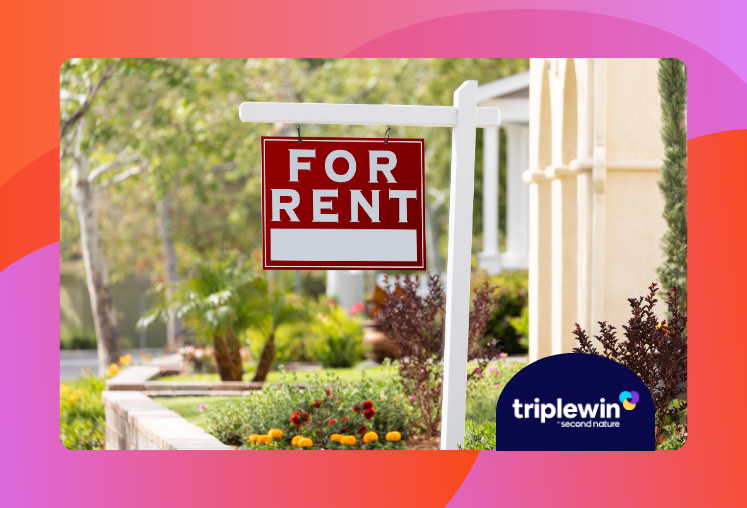What we'll cover
Every property manager and leasing agent struggles with it. It can make or break a small property management business, and dramatically impact the bottom line of even the biggest companies. It’s a core challenge that every PMC has to unlock: how to find good tenants.
Finding good, qualified residents can be challenging. You’re constantly looking for someone who:
- Takes great care of the property
- Pays rent on time
- Is cooperative with inspections and maintenance
At the same time, you want to avoid residents who do things like:
- Treats the property poorly, causes damage, or neglects responsibilities
- Communicates poorly, is hostile to your team, or is uncooperative
- Pays rent late
Bad residents can be expensive, and in extreme cases lead to evictions, which are lengthy, costly, and stressful. Plus, a bad resident can create friction with your clients, increasing churn and damaging your reputation. While it’s not always possible to identify potential bad residents ahead of time, here are some indicators to look out for:
- A history of delinquent payments
- A poor credit score
- Prior evictions
- Fraudulent information on their application
In this article, we’ll look at why finding good tenants is so important, the impact it can have on your business, and how to attract high-quality residents with proper marketing and screening practices.
A note on language:
"Tenants” is an industry term that’s been in use for a long time. But here at Second Nature, we’re trying to evolve the word "tenant." We’ve seen the incredible work property managers do day in and day out to make renters feel like they’re so much more than just tenants – they’re residents. In some instances, like this article, we use the term tenant because it makes it easier for property managers to find, read, and benefit from our content.
What makes a good tenant?
Finding good residents is essential, but what actually makes for a good resident in the first place? We already outlined some behaviors that good residents exhibit, like paying on time and taking care of the property, but what are the underlying characteristics that indicate someone will make a good resident?
- A clear background and credit check: A lack of criminal history and a good credit score indicate that an applicant is more likely to be trustworthy and pay on time.
- Steady, long-term income: Reliable employment is important to ensure that a resident won’t lose their income during their lease and have to vacate unexpectedly, or worse, stop making payments entirely.
- The ability to pay total move-in costs, including the security deposit: Regardless of what you charge up from—first month’s rent, last month’s rent, a security deposit, or miscellaneous fees—you want a resident who won’t have trouble paying. Otherwise, you’ll wind up back at square one, trying to fill a vacancy while your client grows frustrated.
- References, especially from past property managers or real estate investors: If an applicant is willing to share contact information for past property managers or unit owners, that’s a sign they had a good working relationship and were good residents in the past.
- A history of on-time rent payments: If an applicant previously paid on time consistently, that’s another indicator that they’ll be a reliable, qualified resident.
There are other positive indicators, too, like fast response times and a willingness to cooperate throughout the application process, but these things can be much more difficult to measure objectively.
Factors you must not consider when evaluating tenants
There are several factors that you cannot consider when evaluating applicants, due to the Fair Housing Act. This is federal law, but many states have statutes that expand the protections of fair housing. While you should always consult an attorney if you have questions about fair housing in your area, and this is not legal advice, the Fair Housing Act generally prohibits discrimination in housing on the basis of:
- Race
- Religion
- Sex
- National origin
- Familial status
- Disability
Regulatory compliance is an important aspect of running a property management business, so it’s essential to understand fair housing in your state.
Why is finding good tenants so important?
Identifying and leasing to good residents is vital to the success of any property management company for multiple reasons. First off, qualified residents that pay on time provide financial stability. You can count on rest being paid on the first of the month without having to chase them down or threaten them with late fees.
Second, good residents protect the property itself. They’re more likely to proactively communicate about potential maintenance issues that, if ignored, could balloon into expensive problems down the road. Financially-minded residents are also likely to take better care of the property because they want to make sure they get their security deposit back. They’re also more likely to carry up to date renters insurance to protect themselves from potential financial setbacks, which also protects your company and the property.
Finally, quality residents are more likely to renew their leases, and far less likely to face eviction. That means a more consistent stream of income, less vacancy time, and lower turnover expenses.
All of these factors combine to create happier clients, too. When residents pay on time, stay longer, and protect investors’ largest assets, you’re more likely to retain those clients for years to come.
How to attract good tenants for your rental property
Attracting good tenants is something of an art and a science. From screening practices to marketing strategies, you can take steps across your entire process to increase the likelihood of generating applications from qualified residents.
Establish your tenant screening criteria
Standardizing your application form and screening criteria is vital, not just because it’s a fair housing requirement, but because it lets you objectively consider which applicant is best qualified. Consider including these factors in your screening process:
- Credit score
- Monthly income
- Rental history or address history
- Eviction history
- References
- Pet details, if applicable
For example, you may set screening criteria like this:
- Monthly income at least 3x the rent amount
- Minimum credit score of 650
- No recorded felonies
- No recorded bankruptcies
- No recorded evictions
Your specific criteria will vary based on the market you serve and the class of housing you have available, so make sure you consider those factors when developing your screening criteria.
Get your property ready to rent
Making your property fully rent-ready before listing it can also help attract more qualified applicants. Renters in good financial standing with reliable income typically have higher expectations for the quality and condition of the property they’re looking to rent, so making sure all turnover maintenance is completed and the property is in top condition will draw them in. Qualified residents will be put off by dirty or unfinished properties.
Provide coveted amenities
Make sure that you’re including extra amenities to whatever extent possible. Things like off-street parking and in-unit laundry tend to draw in more applicants. If you’re managing multifamily buildings, pet-friendly areas, modern common spaces, and co-working spaces can also be big factors that tip the scales in your favor.
Offer tenants a Resident Benefits Package
A Resident Benefits Package can also help capture the attention of qualified residents, especially those who are particularly financially-minded. Benefits like identity theft protection and credit building will appeal to renters looking to improve their financial standing.
Create a high-quality property listing
Your rental listing description can also have a huge impact on the volume and quality of applications you receive. Make sure you’re painting the property in the best possible light, including the neighborhood and nearby amenities. Remember, you’re selling the lifestyle, not just the walls.
Your rental listing should also answer as many questions as possible so that the resident doesn’t need to reach out for clarification, or, worse yet, move on entirely. Your listing should be as clear as possible about policies, costs, timeline, and the application process so that the resident has all the details they need to schedule a showing and submit their application.
Price your property competitively
Pricing units is a core function of property management, and it can be highly influential in the kinds of applicants you get. Price it too high and you’ll exclude a lot of potential applicants. Price it too low and you may attract applicants who aren’t fully qualified, but who are in search of a great deal. Making sure you’re pricing your properties competitively takes practice, but be sure to factor in the competition in your market, the age and condition of the property, and how much it has cost to maintain in the past.
Create a detailed rental application
Your rental application, like your screening process, should be standardized in order to fairly compare different prospective residents. You should be collecting all of the basic contact information and data needed to run your screening, such as:
- Name
- Current address
- Phone number
- Date of birth
- Income verification
- Credit report
- Rental history
- Pet information
- Copy of their ID, typically a driver’s license or passport
However, your application should go beyond just the basics. A truly great application form also includes details that will help make the approval and move-in process as easy as possible, like:
- Desired move-in date
- Co-applicants
- Desired lease term
- Number of vehicles they have
- References
While the core function of the application form is to qualify residents, you can also set everyone up for success by collecting more information earlier.
How to market your rental property to find good tenants
Now that you have a property and process that will attract great residents, it’s time to focus on marketing. There are some key steps you can take to get more eyeballs on your listings, more showings on your calendar, and more applications in your inbox, all of which will help increase your chances of finding a truly great resident.
List your rental property online
The vast majority of applicants today are finding their next home online. Listing sites have made it incredibly easy for residents to filter, sort, and apply right from their phone. Thankfully, they’ve also made it easy for property managers to create listings quickly that will attract qualified residents.
If you use a property accounting software, it likely already has listing capabilities built in. Most property management tools now offer easy processes for syndicating new listings out across multiple listing sites, saving you valuable time. They’ll distribute your descriptions, pricing, photos, and details, but it’s important to test your syndication functionality and make sure that everything is showing up correctly on the various listing sites.
Here are some of the most valuable sites to be listing on:
- Zillow: Zillow is no longer just for homebuyers, and has captured a huge portion of the rental market, too. Applicants can easily filter by price, pet friendliness, lease term, and more, allowing them to narrow in on the exact properties that fit their needs and lifestyle. Zillow also includes a direct scheduling tool to get showings on the calendar, and an integrated application tool.
- Redfin: Perhaps known best for their home sales tools, Redfin took a giant leap into the rental market in 2021 when it purchased RentPath, and with it several rental listing sites. Redfin offers a number of filters and advanced search features, including a filter to only show results that are currently offering special deals, like first month free.
- Trulia: Trulia has been around for a long time, founded all the way back in 2005. Like Zillow, Trulia offers tools for buying homes as well as renting them. The platform offers an easy contact form to connect renters with property managers, and includes many of the same filters that Zillow does.
- Apartments.com: Owned by Homes.com, Apartments.com is another large player in the space. Despite the name, they offer listings for single-family homes, townhomes, and condos in addition to apartments.
Depending on your particular property accounting software, you may have access to a much longer list of sites. Try them out, see where your listings get the most traction, and optimize for those platforms.
Promote your property listings on social media
Social media is another great place to get eyes on your vacant properties. Whether you’re posting on your company’s page, leveraging local real estate groups on Facebook or LinkedIn, or creating ads, reaching your audience on social media is key.
Eye-catching ads on platforms like Instagram and Facebook can let you get hypertargeted to renters in your area, keeping advertising costs low while still reaching your ideal applicants.
Host an open house
While scheduled showings are common in an on-demand world, don’t overlook the value of a good old fashioned open house. Signs around the neighborhood can bring in applicants who may otherwise not have seen your listing, and they provide a much more personal touch that allows a leasing agent to work their magic. They also allow the applicants to see themselves in the home in a way that just isn’t possible online, even with the best virtual walkthrough tools.
To have the best possible open house experience, make sure that the showing agent knows all of the relevant company policies and processes. Just as an online listing should answer all an applicant’s questions, so should the agent.
Use print media
Despite what many think, print media isn’t dead. There’s still a place for listings in your local paper, which will specifically target the local area. Print listings give you a lot less space than online listings do, so make sure to focus on the most important elements, like the location, price, number of bedrooms, and key features. Make sure to also include information on whether the unit is pet friendly, which is a big boost for modern residents.
How to screen applicants to find good tenants for your rental property
Screening applicants is the last major step in ensuring that your property is occupied by qualified residents. You’ve collected all the relevant information with your application form, so now it’s time to run the screening.
Many properties leverage third-party screening tools, which can expedite the process substantially. If you’re conducting the screening yourself, make sure you’re taking the following steps:
- Check the credit report and background: Make sure that the resident’s credit report lines up with the other information they’ve reported, and that there are no major red flags like bankruptcies or missed payments on loans.
- Verify employment and income: Follow up with the employment references the resident has listed and do your due diligence to ensure that their employer is a valid company.
- Review rental history: If a resident has provided rental references, call to verify their dates of residency and their good standing as a resident. Speak to them on the phone and get their perspective, rather than relying on a simple verification letter.
- Check criminal records: There are several online services that can conduct criminal background checks. Make sure the one you select offers multi-state screening so that you can be alerted to any criminal history from other states or jurisdictions.
Make sure that you’re remaining compliant with fair housing laws at every step, and if you have any questions about fair housing, be sure to consult an attorney.
Attract good tenants with Second Nature
When you put resident experience first, you attract better residents. With Second Nature’s Resident Benefits Package, you can deliver a top-tier resident experience that helps boost financial wellness, improve the day-to-day rental experience, and reward residents for good behavior.
If you’re interested in learning how Second Nature can help you attract more qualified residents, join our next RBP Workshop, where you’ll hear from real property managers who have implemented resident benefits to boost their business.




